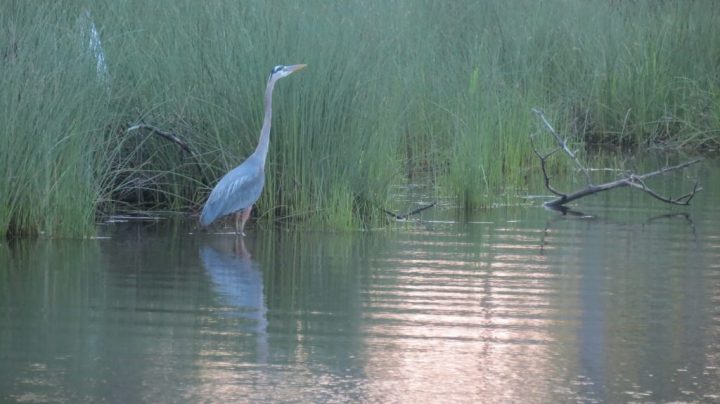
BEAUFORT COUNTY — Conservation groups and area residents are celebrating a recent victory in the six-year-long fight to protect Blounts Creek, a popular fishing spot and recreation area, from becoming a wastewater dump for a mining operation.
A superior court judge has vacated a state water quality permit that would have allowed the discharge every day of millions of gallons of wastewater from a proposed Martin Marietta Materials Inc. mine into the creek. Judge Joshua Willey Jr., who heard the case in Carteret County in October, issued his ruling Dec. 18, reversing a previous ruling by an administrative law judge. Willey found that the state Division of Water Resources had not ensured reasonable compliance with the biological integrity standard, or required protection of the creek’s aquatic species, and that permit challengers had sufficiently established that they were affected.
Supporter Spotlight
While enjoying the win, opponents of the company’s plan are bracing for another appeal.
The Southern Environmental Law Center fought the Division of Water Resources’ permit on behalf of the North Carolina Coastal Federation, which publishes Coastal Review Online, and Sound Rivers, which monitors and protects the Neuse and Tar-Pamlico Rivers and watersheds. Blounts Creek is vital habitat to a diverse community of fish, including red drum and river herring, according to a statement from the law center.

“This ruling affirms the fundamental requirements of our state and federal water quality laws that require state agencies to protect the biological integrity, fish, and wildlife of our coastal creeks and sounds,” said Todd Miller, executive director of the Coastal Federation.
In order to develop a 649-acre limestone mine within a 1,664-acre quarry east of Vanceboro, Martin Marietta planned to pump up to 12 million gallons of groundwater daily from the open pit, mostly from the Castle Hayne aquifer, through miles of ditches, mixing with stormwater runoff on its way into Blounts Creek’s headwaters. The result would transform the swampy, slow-moving headwaters habitat into a fast-flowing stream of mostly mine wastewater, which would permanently alter the creek’s habitat and diversity of fish.

Heather Deck, Sound River executive director and Pamlico-Tar Riverkeeper, noted that the campaign to save Blounts Creek had continued six years and “never once did the community waver in their commitment to ensure the creek is protected for future generations.”
Supporter Spotlight
“This is a win to be shared by many,” she told Coastal Review Online. “The community members were very pleased with the outcome. Their work has been to ensure the creek is protected in its current, high-quality state and this ruling does that.”
Biological Integrity
Blounts Creek is tributary to Blounts Bay, which flows into the Pamlico River.
Bob Daw, one of the founders of the community organization, Save Blounts Creek, said the creek’s brackish waters attract fishermen from all over the state to catch saltwater fish such as speckled trout, flounder and puppy drum.
“I estimate that 75 percent of all fish caught by sportsmen and women in Blounts Creek are saltwater fish,” Daw said, adding that 12 million gallons of groundwater pumped into the creek every 24 hours for 50 years “would destroy what God intended to offer us with our Blounts Creek.”
Martin Marietta had noted in its permit application that the creek, altered by the proposed discharge, would no longer support its existing diversity of fish species and would no longer be considered swamp waters because of the increased flow, increased alkalinity, reduced salinity and other changes to the creek that would result from the discharge.
The Division of Water Resources’ lead biologist found that the creek with the wastewater would be unlike any creek naturally found in eastern North Carolina. Under federal and state law, North Carolina cannot authorize discharges that will violate water quality standards by changing the natural mix of species in a water body.
Judge Willey noted that state environmental regulators had concluded that the discharge into the creek would have minimal effects without first evaluating species and conditions in the creek, and then used that conclusion as a basis for not making the required evaluations.
“The Biological integrity standard is clear; DWR must protect the indigenous community by determining reference conditions in terms of evaluated impacts on the community’s species composition, diversity, population density and functional organization,” according to the ruling. “Reference conditions must be specific enough to allow the agency to apply the biological integrity standard properly. Therefore DWR did not ‘reasonably ensure compliance with’ the biological integrity standard. Consequently, the agency exceeded its authority and erred as a matter of law when issuing the permit.”
The Public’s Right
The reversal also included recognition of the public’s right to challenge the permit.
In the previous ruling, Judge Phil Berger Jr., son of N.C. Senate leader Phil Berger, held that a local marina owner’s business was a hobby and that residents who boat and fish on the creek lacked legal standing to challenge the state’s permit.

The Beaufort County Superior Court reversed that decision on appeal by conservation groups and granted a formal hearing. After the formal hearing, Berger again held that the citizen groups could not challenge state water quality permits and that the permit was lawfully issued.
Conservation groups again appealed.
“This court decision is a victory for the people, affirming citizens’ right to protect the waters we love and use every day when our state fails to do so,” Geoff Gisler, senior attorney at the law center, said in a statement. “We’re pleased that the court overturned the permit that violated the core requirement of the Clean Water Act: to protect our waters as they exist naturally. The community that uses Blounts Creek deserves the protection that the law provides as affirmed by this court decision.”

Capt. Bob Boulden with Miss Bea Charters is also part of Save Blounts Creek. Boulden was pleased with the ruling.
“Having the decision in favor of the Blounts Creek community, with many thanks to Sound Rivers and the SELC (Geoff Gisler and Blakely Hildebrand), Jimmy and Pam Daniels (Cotton Patch Landing) and my business Miss Bea Charters will continue to grow and we will be able to share with others what makes Blounts Creek so special,” Capt. Boulden responded in an email. “It was especially appreciated that Judge Willey overturned what Judge Berger failed to see as inconsistencies in the erroneously issued permit to Martin Marietta Materials Inc.”
Boulden said that if the ruling had been in favor of Martin Marietta they would continue to have the support of Sound Rivers and the SELC.
Deck said that next, the group will wait to see what the company and the state do in reaction to the latest ruling.
“Sound Rivers is committed to finding a solution that works for all involved; but certainly will continue to work to ensure that Blounts Creek is protected for the long term,” Deck said. “This win is not only critical in protecting special places, like Blounts Creek, but to also maintain the public’s right to access the courts when our regulatory agencies get it wrong. That is something we fought hard to protect.”
Coastal Review Online Assistant Editor Jennifer Allen contributed to this report.







